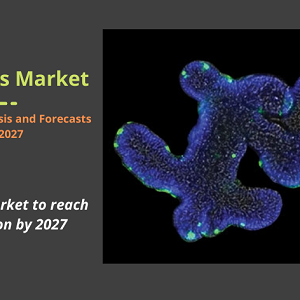Organoids Market Hits US$ 3,420.40 million by 2027 and to grow at a CAGR of 22.1%
Organoids are tiny, self-organized three-dimensional tissue cultures that are derived from stem cells. Such cultures can be crafted to replicate much of the complexity of an organ, or to express selected aspects of it like producing only certain types of cells. Organoids grow from stem cells—cells that can divide indefinitely and produce different types of cells as part of their progeny. Organoids can range in size from less than the width of a hair to five millimeters.
The scope of the organoids market includes type, application, source, and region. The organoids market is analyzed based on regions, such as North America, Europe, Asia Pacific, Middle East & Africa, and South and Central America. The report offers insights and in-depth analysis of the organoids market emphasizing on various parameters, such as market trends, technological advancements, market dynamics, and competitive landscape analysis of leading market players across the globe.
Request for sample at: https://www.theinsightpartners.com/sample/TIPRE00017616/
STEMCELL Technologies, Inc, Cellesce Ltd., Hubrecht Organoid Technology, Definigen, 3Dnamics, Inc., Organoid Therapeutics, PeproTech, Inc., Thermo Fisher Scientific, Corning Incorporated (Life Sciences) and Merck KGgA. are among the key companies operating in the global organoids market. Leading players are focusing on the expansion and diversification of their market presence, and acquisition of new customer base, thereby tapping prevailing business opportunities.
In 2019, North America dominated the global organoids market. The market growth in the region is credited to the rise in the implementation of organoid-based research models in the biotechnology sector in US and Canada. These novel technologies have helped the researchers to overcome limitations faced by 2D cell culture platforms as 3D spheroids offer a microenvironment that can mimic the properties of human tissue structures. The market growth in Canada and Mexico is attributed to the presence of international market players, increasing adoption of advanced technologies, and existence of supportive government regulations. Based on type, the organoids market is segmented into stomach, intestine, liver, pancreas, lung, brain, kidney, and lung. The intestine segment accounted for more than 23.31% of the market in 2019. On the basis of application, the organoids market is segmented into developmental biology disease, pathology of infectious disease, regenerative medicine, drug toxicity and efficacy testing, drug discovery and personalized medicine, and others. The developmental biology disease segment is expected to held the largest share of the market in 2019 owing to its consideration as primary investigative research tool of the human developmental biology. Further, the pluripotent stem cells segment accounted for a larger share in the organoids market, by source, in 2019.
Personalized medicine is a flourishing area of therapeutics that relies on specific drug delivery and dosing. As per a study published by PMC, personalized medicines accounted for only 5% of the new FDA-approved molecular entities in 2005, whereas they accounted for more than 25% in 2016. Additionally, 42% of all compounds and 73% of oncology compounds in the pipeline have the potential to be prescribed as personalized medicines. Biopharmaceutical companies have nearly doubled their R&D investments in personalized drugs in the past five years, and they are further likely to increase by 33% in the next five years. Biopharmaceutical researchers also predict a 69% increase in the development of personalized medicines over the coming five years.
The implementation of organoids to create personalized drug therapies is providing exciting opportunities for improving patient care. Recent research has highlighted that more than 50% of consumers express an interest in purchasing customized products or services. Since the release of the Precision Medicine Initiative in the US in 2015, pharmaceutical researchers have been pursuing the development of more tailored treatments for making medicines safer and more effective.
Personalized cancer therapy involves using personalized tumor models with similar characteristics to the original tumors, which may result in accurate predictions of drug responses in patients. One of the key advantages of tumor organoid models involve the conservation of molecular and cellular composition of the original tumor, which highlights the tremendous potential of tumor organoids in personalized cancer therapy, particularly in preclinical drug screening and predicting patient responses to selected treatment regimens.
In terms of type, the kidney organoids segment is anticipated to register the highest CAGR in the organoids market during the forecast period. Kidney organoids, derived from human pluripotent stem cells, have the potential to assist the drug development process. An international team of researchers—led by Nanyang Technological University Singapore (NTU Singapore)—has grown “miniature kidneys” in laboratory, which could be used to better understand the mechanism of development of renal diseases in individual patients. The mini kidneys, i.e., kidney organoids, were grown in vitro from skin cells derived from a single patient who had polycystic kidney disease, one of the most common inherited causes of kidney failure in adults. In terms of application, the developmental biology disease segment accounted for more than 29% share in global organoids market in 2019. In terms of source, the market for the pluripotent stem cells segment is anticipated to grow at a higher CAGR during the forecast period.
In Sep-2018, STEMCELL Technologies Signed a partnership agreement with Brigham and Women’s Hospital to commercialize a human pluripotent stem cell-derived kidney organoid culture system.
Place An Order Copy of this Report at: https://www.theinsightpartners.com/buy/TIPRE00017616/
Media Contact
Company Name: The Insight Partners
Contact Person: Sameer Joshi
Email: Send Email
Phone: +1-646-491-9876
City: Pune
State: Maharashtra
Country: India
Website: https://www.theinsightpartners.com



